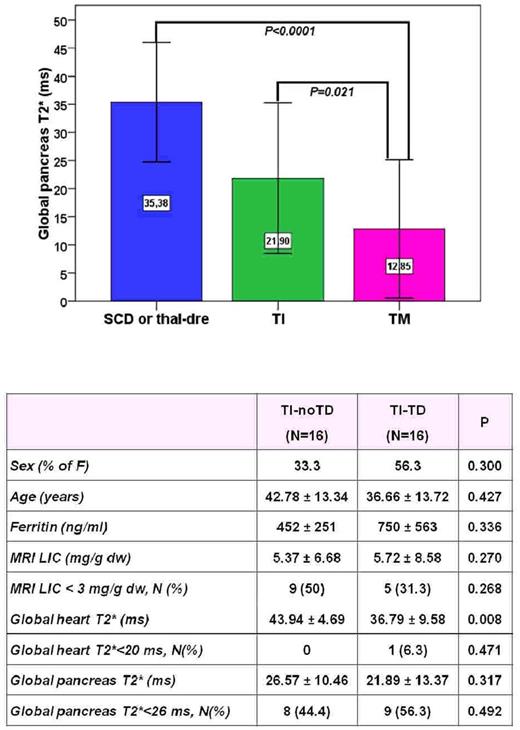Abstract
Background.The MIOT (Myocardial Iron Overload in Thalassemia) project is a multicentric study aimed to validate the T2* Magnetic Resonance Imaging (MRI) technique as non invasive approach for the cardiac and hepatic iron overload assessment in patients with hemoglobinopathies and to correlate the T2* values with other clinical-instrumental parameters. More recently, the E-MIOT (Extension-MIOT) project has been approved, with the aim of adding the assessment of the pancreatic iron
Methods. We report the baseline MRI findings at the end of the first year of recruitment in the E-MIOT study, outlying the differences among different emoglobinopathies.
Results. First, we selected all transfusion-dependent (TD) patients: 7 with sickle-cell disease-SCD or thalasso-drepanocytosis (42.9% F, 32.47 ± 17.93 years), 16 with thalassemia intermedia-TI (56.3% F, 36.66 ± 13.72 years), and 232 with thalassemia major-TM (55.6% F, 36.95 ± 9.83 years). Sex, mean age, serum ferritin levels, MRI liver iron concentration (LIC) values, and global heart T2* values were comparable among the three groups of patients. Pancreatic T2* values were significantly lower in TM patients versus both SCD and TI patients (see Figure).
Second, we focused our analysis on all TI patients, divided in two subgroups: transfusion dependent and no-TD. Global pancreas T2* values and the number of patients with pancreatic iron (T2*<26 ms) were comparable between the two groups (see Table).
Conclusion. SCD and TI TD patients have lower pancreatic iron loading than chronically-transfused TM patients. Much of this disparity can be explained by the larger transfusional burdens and durations observed in TM patients (years of regular transfusions: 34.18 ± 10.75 in TM, 22.27 ± 18.53 in SCD and 28.33 ± 15.30 in TI, P=0.023). However, TI-TD and TI-noTD patients had comparable pancreatic T2* values. So, innate differences in iron handling and elimination among different diseases also could contribute to the differences in pancreatic iron loading.
Pepe: Chiesi Farmaceutici and ApoPharma Inc.: Other: Alessia Pepe is the PI of the MIOT project, that receives no profit support from Chiesi Farmaceutici S.p.A. and ApoPharma Inc.
Author notes
Asterisk with author names denotes non-ASH members.


